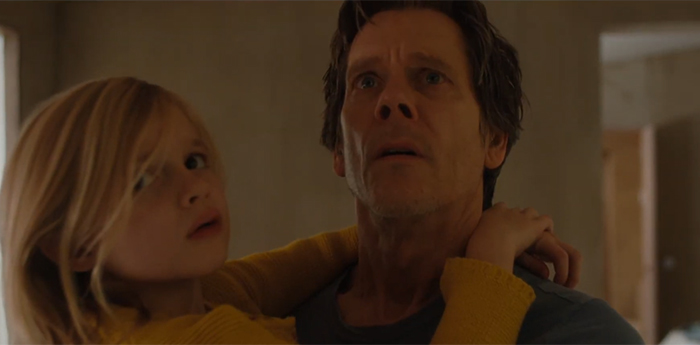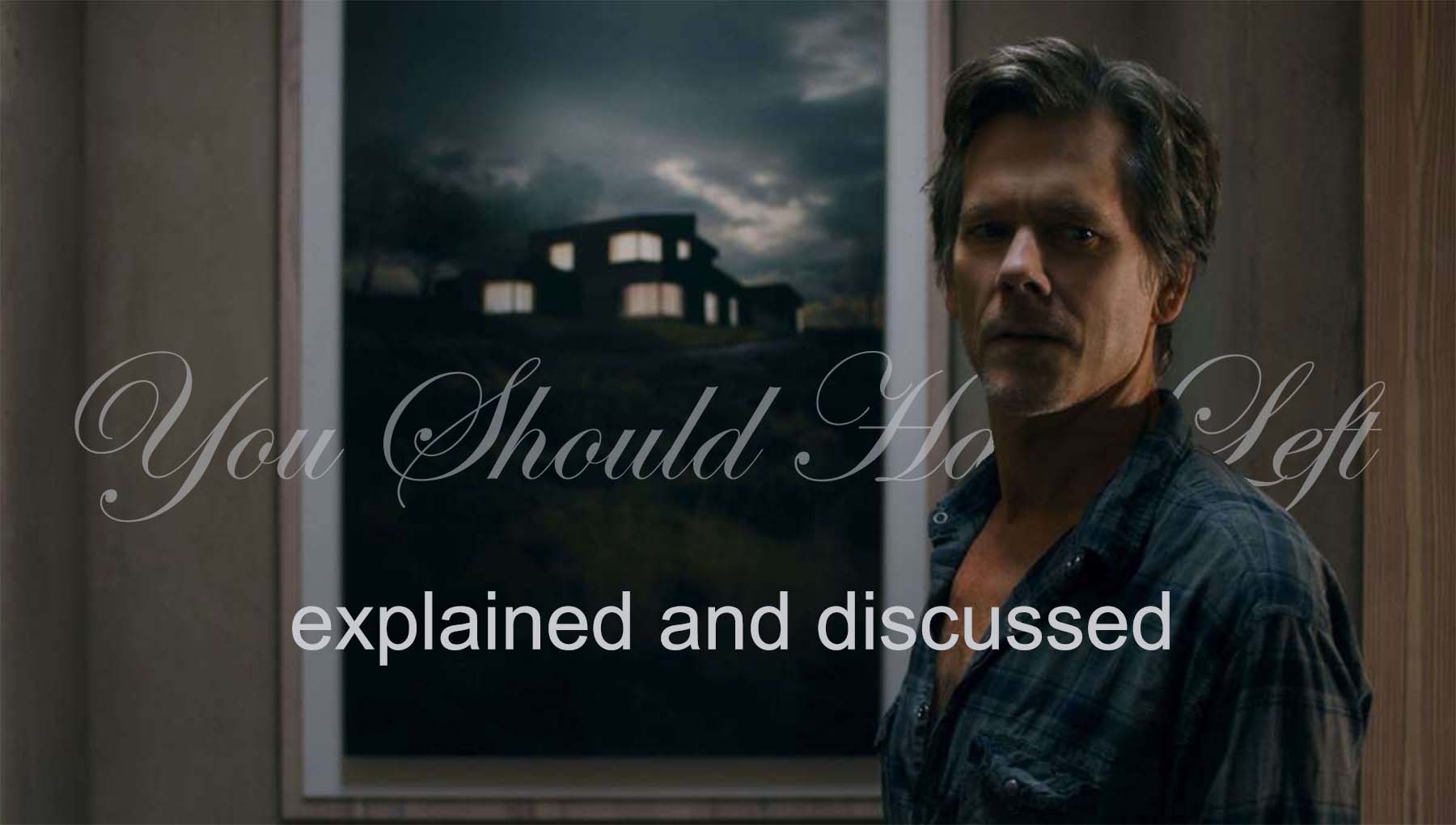I have to say, this global pandemic really has put a crimp in the movie making community. But every now and again there are glimmers of life. I have to admit, I am more than a little hyped about Tenet, which, hopefully, will reopen America’s theaters. (My wife thinks me insane to go into a movie theater to watch some technicolor celluloid. But it isn’t just ANY technicolor celluloid dear! It’s Christopher Nolan celluloid!) Today though, I have for you the movie You Should Have Left Deconstructed and Explained. And we will be very happy with this development. Won’t we? Yes, class, we will.
If you aren’t aware of what the movie You Should Have Left is…it is a closed box (I adore closed box films, and you should too, if you have no idea what I’m talking about, check out my pile of closed box movie reviews right here) film, with Kevin Bacon (you know, from Apollo 13, and A Few Good Men, etc., etc.) and Amanda Seyfried (from Les Misérables, and the brilliant First Reformed). It’s based on the novel of the same name by Daniel Kehlmann. Here, try out the trailer, let’s see if you are digging it.
But today, we aren’t here really to convince you to watch it. I mean, if you are convinced because I said I enjoyed it… great. But what we are mainly here to do is to unpack it, unravel it, and make sense of it. And mostly! we are here to discuss it. So, as always, let’s do a quick walk through of the film, and make sure we are all on the same baseline of what happened before we try and make sense of it. But it should go without saying – everything from here on out should be considered spoilers…
You Should Have Left Movie Walkthrough
The movie opens with an important nightmare sequence that will play into our discussions about what is really going on here. It’s all about Ella (played by Avery Tiiu Essex) having a dream about an old man haunting her dreams. But we realize that it is actually a nightmare within a nightmare… and the nightmare isn’t actually Ella’s, but rather Theo’s (Kevin Bacon). He obviously has issues. He has a past. And there is something deep and troubling coursing through his veins. It’s referred to regularly, but we have no idea what is really going on as the movie starts. But looking backwards, it’s simple to explain: Theo was previously married, and his wife died. She drowned in the tub, having taken drugs. And the entirety of this movie circles this particular drain as we try to understand what really happened that particular night.
Theo heads to the set, to meet his wife, but he isn’t allowed on. Why isn’t he allowed on the “closed set”? Is it because he might have murdered his wife? Is it because his wife is filming a sex scene on set? Is it because his wife is having an affair with the man she’s filming a sex scene on the set with? Because – spoiler alert – all of these are a solid yes. And we see that Theo is concerned that he’d been “recognized.” But for WHAT? He was a banker before he met the aspiring actress, Susanna (Amanda Seyfried), and was really no one. Oh, right, but his wife died in a scandal, and it was splashed all over the tabloids. (Nevermind the fact that he would just be recognizable now as Susanna’s significant other… no? Unless, I guess, Susanna is a pretty new actress, known more for her porny roles? Who knows.) After Theo confronts Susanna about not being allowed on set, they decide they need to get away, so they grab a cabin in Wales and escape.
The house is a glorious modern getaway, and everyone seems to like it. But even that first night weird things begin happening. When Theo heads around the house to begin shutting things down, he discovers new areas, and new lights that turn on and off at will. But the weirdest thing is that by the time he gets back to bed, 5 hours have past.

Correlations to House of Leaves and Annihilation
One of my favorite books is House of Leaves. Nothing will ever compare to Infinite Jest but it was a very very good book. A love story really, wrapped in the tendrils of a horror novel. But in that book, the central premise is a house that is larger on the inside than the outside. And in the book You Should Have Left – and also the movie – this idea plays a prominent role. This idea that not only is the house bigger on the inside, but that it is rapidly expanding, all while remaining unchanged on the outside. And heck, while we are at it, Jeff VanderMeer’s Southern Reach Trilogy, specifically Annihilation has murmurs and echoes of this same idea rippling through it. (‘Where lies the strangling fruit that came from the hand of the sinner I shall bring forth the seeds’) This ongoing, deep spiral dive into some unknown inner core. (‘of the dead to share with the worms that gather in the darkness and surround the world with the power of their lives while from the dimlit halls of other places forms that never were and never could be‘) You Should Have Left, follows in the footsteps of these other books, even pays homage to them occasionally. But I have to say, while similar, the house in You Should Have Left really is something different. Why? How could I know? Well, because by the time we get to the end, we know the answer to that question of what this house is. (‘and never could be writhe for the impatience of the few who never saw what could have been.‘)
Annihilation was this scary burrowing of nature into man. Or man into nature. Or some unfriendly amalgam. The House of Leaves seemed to be an endless recursion of possibilities and impossibilities. And You Should Have Left is more a penance, or payment and debt to sin. A trap of insanity caused by a very specific moral failing. And so, though it seems to be really derivative, I’d argue it isn’t (well, this aspect of the show anyway).
Continuing On…
From here on out, the suspicions, the curiosities, and intricacies of the house just get more and more extreme. Theo, we learn, is jealous of Susanna, and is constantly rummaging through her devices, iPad, and computer. Theo, we find out, journals, and listens to self help recordings in an attempt to tamp down his inner turmoil, stress, and strain. That morning, while journaling, he sees that someone (he) has written in the journal that they should leave now. He convinces Susanna that they should go, but just before they do, he finds Susanna’s second phone. The one where he discovers that Susanna has been having an affair with the costar of the film she’s been working on. He tells her to leave, and she does.
In his comings and goings he sees a door that wasn’t there before, and he follows a stairwell down. There, he finds a wall of Polaroids, of him and his daughter. He finds Ella wet, blue, and spewing water, and it’s one big flashback to his wife’s death in the bathtub. He thinks that he is dreaming, and so he stabs himself in order to wake himself up. Determined he and Ella need to leave, Theo decides he will try and get a taxi from town, but when that doesn’t work they walk. As they leave the house, they see a dark form inside the house watching as they leave. And then, as they finally start to get close to the lights, Theo realizes that they have returned to the house they had just left.
Tucking Ella in – who was rightfully beside herself – Theo sleeps beside her. As he falls asleep, he is awakened by a flash of light. As he heads off to see what it was, he finds photos, and ultimately walks in on himself journaling. Theo’s watch is jumping forwards and backwards signifying his temporal unmooring. He watches as Susanna arrives, but he jumps further back in time. He speaks with Stetler, and Stetler tells him that he has had a lot of names, a lot of faces, and a lot of houses. Most importantly, Stetler tells him that he has had a room there in the house for Theo for a very long time. That he and Ella will remain there for an eternity. But Theo wants Stetler to let Ella go. But in order for Stetler to let Ella go, Theo knows what he has to do.
And so, Theo, with great gnashing of teeth, heads out with Ella to meet Susanna at the car. Theo tells Susanna that he is going to stay. That he loves her, and that Susanna needs to take care of Ella for him. But why? Why can’t he go and they work it out? Well, because, you see…Theo did kill his wife. Maybe not specifically directly. But he watched her slip under, and he did nothing to help her. “All those years being angry, I should have left…but I didn’t.” And with that, Susanna leaves with Ella, and Theo becomes Stetler, haunting the house, tormenting it, as punishment for his crimes against his wife.
You Should Have Left Movie Explained
99% of all horror movies are literally dealing with the burden and the weight of sin. I am literally not exaggerating or joking. I mean, it’s obvious right? I don’t really have to explain it, do I? Generally, the film starts by developing the characters, we learn of their flaws, and mistakes, and as the horror is revealed, we learn that it is their original sin that drives the fear forward. The perfect horror film would require you to fill out a survey before hand…wherein you let the proctor know that you stood and watched while your best friend was hit by a car, or the horror you feel remembering the time you stole your best friend’s airpods, and didn’t tell them. And then the film utilizes these details to customize the terror of the experience to the heft and weight of your past failures. Ultimately someone has to pay though, right? Someone needs to make amends?
And here, in You Should Have Left, the driving engine of this film is Theo’s past. All of it, barreling forward from one horrible choice. The night Theo chose to watch as his wife died in a bathtub, a murder solely because he could have easily prevented it. A horrible sin of omission. But a sin all the same. Now, the movie, which seems to say that there is no forgiveness of sins, for any of our past mistakes, takes particular issue with this enormous moral failing of Theo’s. (Who’s to say that stealing shouldn’t also be punishable by admission to the house, admission with no release in sight? Or rape? Or what about white collar crimes? Heck, what about Susanna’s infidelities? Why isn’t this punishable by a trip to the back of the house of eternity?)
The trick of You Should Have Left is pretty clear. Theo is trapped by his sins, and he is forced to inhabit the house throughout time, both forwards and backwards. Which means, that when they first arrived, it was Theo that was haunting them. Theo was haunting Theo. Which, is pretty profound if you think about it. When was the last time that you haunted your own dreams? Well, last night probably! When do we not haunt our own thoughts and hopes and dreams? We are the creators of our destinies, and the destroyer of our destinies. We are our own worst nightmare.
But while it is a clever flip at the end, the main thrust of the entire film’s purpose is the fact that someone has to pay for our moral failings. This is a direct reference to Christ, and to our need for a savior. I’m literally not trying to get religious on you, I promise. I’m just telling you what I’m seeing here. Without someone to pay the price for Theo’s murdering of his wife, we innately know that he will pay that penalty somehow. The film shows him paying that price through his own voluntary entrapment in the house. If only there had been a savior to come and pay that price in advance for Theo.
If you are looking for other similar movies – maybe you could check out The Little Stranger, Or A Ghost Story? Are there other movies like this one that you guys can think of?
Edited by: CY



